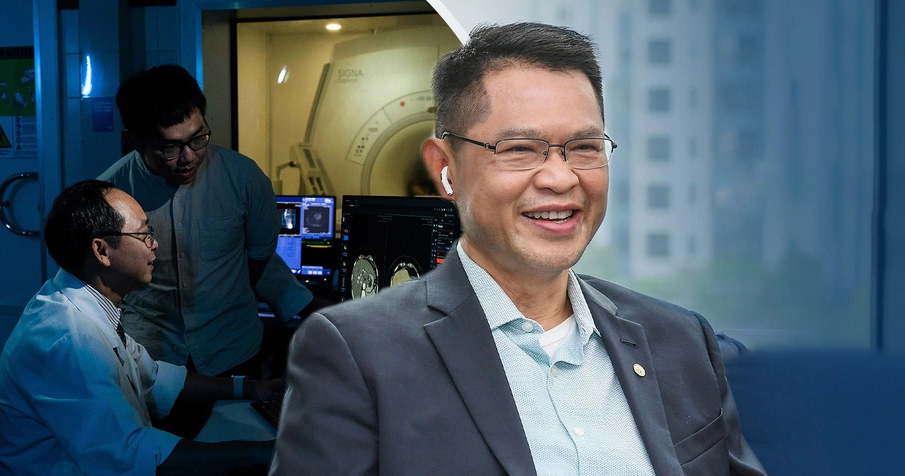
“To be successful in artificial intelligence, it depends on the business's products being unique, different, high quality, with complete data and how to scale up. When there are those things, the product will be unique and the business will have high value" - Mr. Truong Quoc Hung, CEO of VinBrain said.
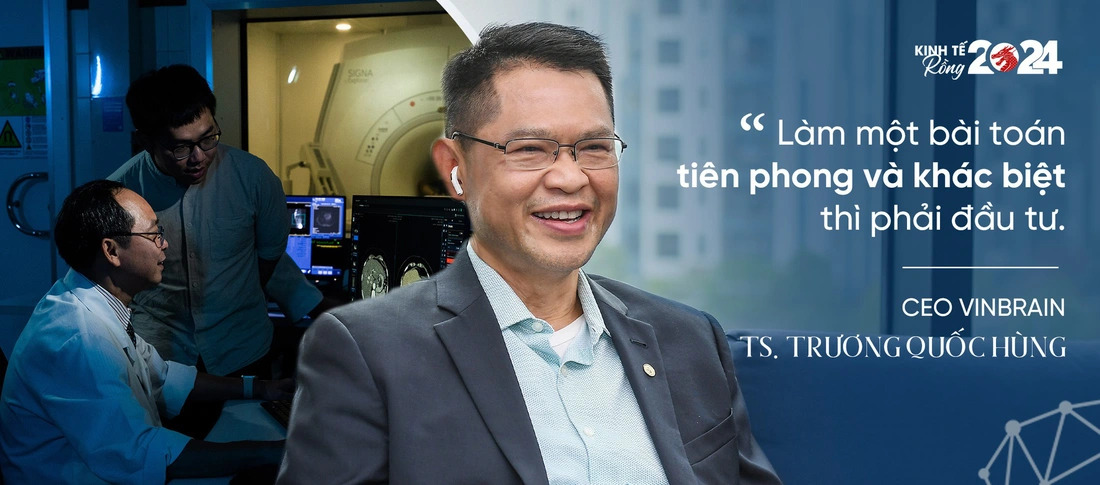 Caption: "To forge a new path, investment is the fuel that ignites progress."
Caption: "To forge a new path, investment is the fuel that ignites progress."
Steven Truong - CEO of VinBrain still walks to work every day. In particular, in the room of the person who once held the position of Director of Artificial Intelligence (AI) of Microsoft (USA), the desk is not like normal. It's very high and has no seats, that's because Steven always stands to work. Initially, only the CEO used this strange desk, but now every VinBrain department has one.
"Standing to work will help us be more active, without feeling sluggish like when sitting. It's like VinBrain's culture: Always moving. No AI is perfect from the beginning, it's like humans Therefore, we always have to learn, change, continue to improve and refine" - Steven said.
Established in 2019 with a charter capital of 30 billion VND, by 2023, VinBrain has increased its scale more than 20 times and created breakthroughs with an AI product in the medical field called DrAid. They develop DrAid products in three strategic directions: Comprehensive X-ray Screening; Oncology Diagnosis and Treatment; and the line addresses diseases of the century such as tuberculosis and congenital anemia (Thalassemia).
VinBrain is also one of the first businesses to commercialize medical AI products in the international market.
 Caption: The Hit with Mr. Pham Nhat Vuong
Caption: The Hit with Mr. Pham Nhat Vuong
Working as Director AI of Microsoft in the US, why did you decide to return to Vietnam?
In the summer of 2018, my mother had a stroke and I returned to Vietnam to take care of her. When I went to the hospital, I saw many people suffering very much. They have to travel from the countryside to the city, line up at 3 a.m. to get a number and wait until noon to see a doctor for a 5-minute examination. Then they returned to their hometowns, some even had to bring their children with them. I feel very sad.
Working at Microsoft, we may be good at technology and creating economic value, but I think we need to use this technological knowledge to serve more people and our nation first. I also hope for a future that brings the value of Vietnamese intelligence abroad. By doing so, it will create motivation for our young people to reach the world.
So I thought about the problem of AI for the medical industry. A few friends introduced me to the Chairman of Vingroup. During our first meeting, as soon as he heard me talk about the problem of saving people, Mr. Vuong stopped at the table and told me to quit my job at Microsoft and join Vingroup next month.
At that time, I didn't know much about Vietnam, I didn't even know who Vingroup or Chairman Vuong was because I had been abroad for 26 years. But I see here a great national spirit, it creates sympathy between us.
Ultimately, this is a great opportunity as Mr. Vuong has created a playground for me to bring useful values to society. Then I'll just do it. Of course, I've been with Microsoft for decades, so I can't say I quit right away like he wanted. It took a few months to arrange my work, then I returned to Vietnam and became VinBrain's first employee.

Caption: "Ultimately, this is a great opportunity as Mr. Vuong has created a playground for me to bring useful values to society. Then I'll just do it."
Developing AI for healthcare is considered much more complicated than other types of AI. What did you see in this market that made you decide to implement it?
The first thing I think about when bringing AI into the medical field is to save lives. Saving that person comes first from supporting early detection of diseases, especially cancer. Thanks to early detection, early treatment can prolong the patient's life. That alone can create huge social value.
As for doctors, if you do some research, you will know that a radiologist has to get up early every day to read hundreds of files. Even though they only examine the patient for 5 minutes, before that they have to study records, look at X-ray images, CT scans... Then AI will perform the screening step to help doctors prioritize examining people with unusual signs. Doctors will no longer have to read all 100 images but will only have to read about 50-60 images.
Another problem is about tuberculosis. In the past, to screen for tuberculosis, doctors had to take sputum from the body and then do a PCR test. After 1 or 2 weeks, if it is discovered that this person has tuberculosis, the hospital will notify them to prescribe medicine.
Such a process costs about 50 USD, but now, from the screening stage thanks to AI and then combined with DrAid for diagnosis and prescription, the base price can be reduced to less than 1 USD, which is a reduction of 50 times.
I always believe that products that create social impact will lead to economic impact, not just thinking about making money first.

Caption: Building AI for healthcare is times more difficult than for other AI.
VinBrain's DrAid is introduced as one of the pioneering solutions in the world to support the diagnosis and treatment of liver cancer and rectal cancer. Confidently claiming a pioneering role means that the world does not yet have similar solutions. If so, why haven't people been able to do it yet and what motivated you to create this solution?
According to WHO data, liver disease is one of the most severe diseases. For people with liver cancer, if not detected early, they can die within just 1 month. The 5-year survival rate of liver cancer patients is the lowest among all diseases, about less than 20%. The current rate of liver cancer in Vietnam is even higher than lung cancer and it is very difficult to detect because it is located deep in the body.
Therefore, VinBrain thinks that if we use AI technology, we can detect this disease early. AI technology can also help accurately assess the extent of cancer, detecting the location of tumors as small as 5mm - a level of accuracy that even experienced radiologists can ignore. These are very important points when normally, doctors must measure whether the tumor is near blood vessels or not, and where in the liver it is located. Liver surgery is very complicated and the death rate is very high. Only when the key factors are identified and early can the risk rate be reduced.
Regarding the question of why there aren't many people in the world who do it? Because of complexity. Three factors are needed to make AI products in liver and rectal cancer. That is big data, people and a force of good doctors. During the development process, there is also a need for continuous evaluation, improvement and appraisal. No AI is perfect from the beginning, it is like humans, always having to learn, change, continue to improve and refine.
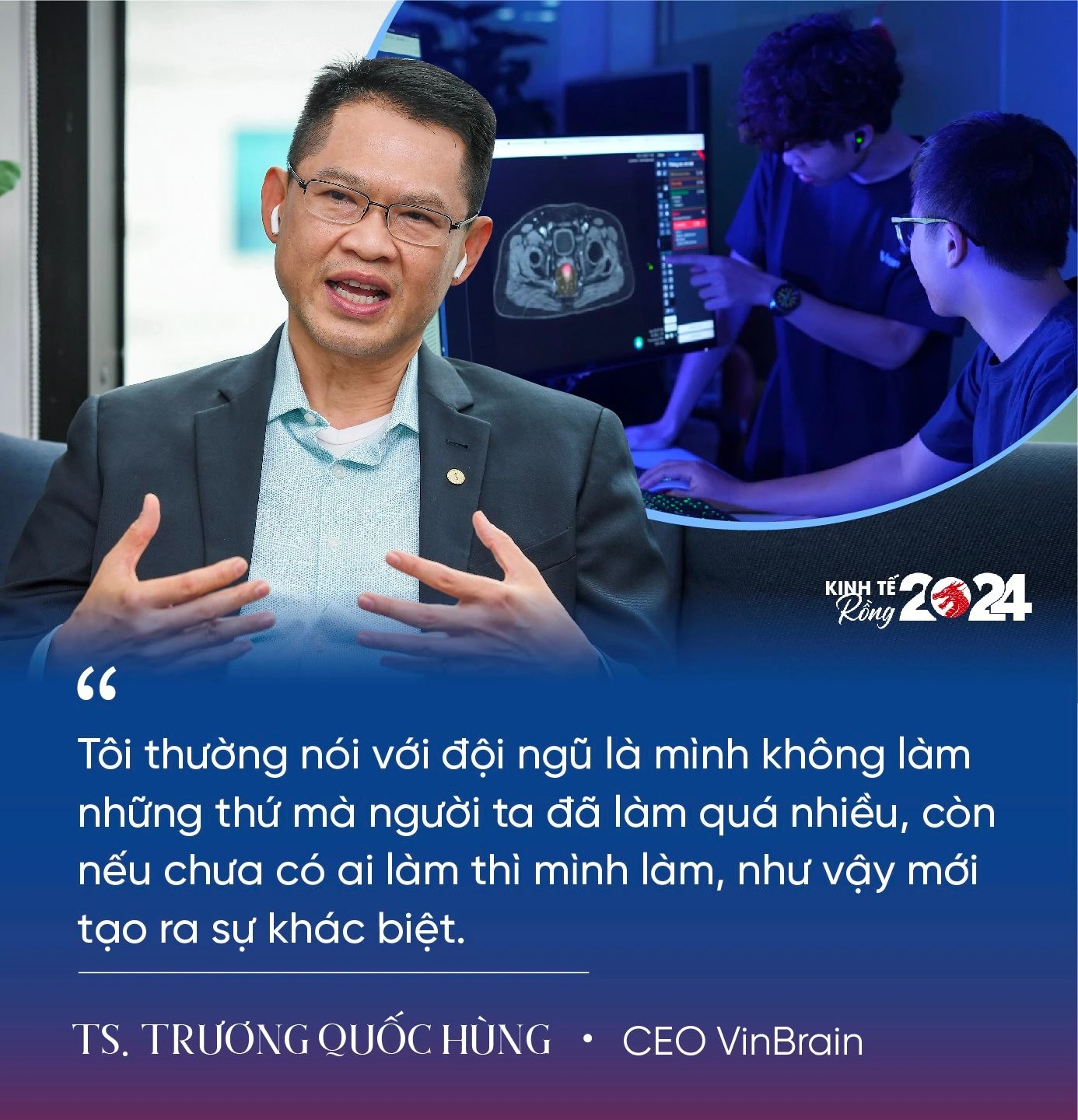
Caption: "I often tell the team that I don't do things that other people have done too many times,
but if no one else is doing it, then we will do it, that will make a difference."
VinBrain has all the favorable factors to create products.
First, we have to collect raw data, that is, image data from the patient's symptoms. After the data is cleaned, removing low-quality images, specialized doctors will perform labeling, that is, localize the tumor, classify what type of tumor it is, and label the images. that image, for example: where is this tumor located, what size is it...
Such a labeled data set is included in the machine training process to create a model. This model continues to be evaluated and assessed for quality based on Golden Standard standards. When it meets the desired standards, it begins to be piloted, that is, tested in hospitals that VinBrain cooperates with, currently about 150 hospitals in Vietnam and internationally.
The data collected is not just for Vietnam but must be on a world scale. VinBrain today has a number of computer training images of nearly 5 million including Vietnam, America, Europe, India, China... and the number of language hours is more than 25 thousand hours to produce health reports.
Only then will VinBrain be a pioneer in AI. And for DrAid to be used in the international, 'go global' market, we must obtain US FDA certifications.
This takes a lot of effort, time and money. Vinbrain is the first unit in Southeast Asia to have an FDA for pneumothorax and is now waiting for the next FDA certification for liver cancer.
I often tell the team that I don't do things that other people have done too many times, but if no one else is doing it, then we will do it, that will make a difference.
Are there any obstacles to accessing and collecting data in Vietnam?
At first, doctors and hospital leaders also expressed concern about what we were getting the data for? We have approached using non-identifying data, meaning we do not know who that image or medical record belongs to.
At that time, it becomes data that can only be used in research, with no information security issues. Another advantage we have for accessing data is Vingroup's reputation. More importantly, VinBrain is a highly qualified unit. When we interact with doctors, we really build trust and they become more open.
In fact, during the Covid period, Vinbrain's AI has proven effective. Since there was no vaccine, our team went into infected areas to collect data, teach machines and then provide them to the Ministry of Health for free, helping Ho Chi Minh City and Bac Giang solve many problems. problem.
For example, during a period when ventilators in Vietnam were few, hundreds of thousands of people were infected but there were only a few thousand ventilators. VinBrain's AI has evaluated to determine whether this patient needs a ventilator or not, how many days this person needs to use the machine... And so, the machine is optimally distributed to those in need.
Another example, when the medical force is overloaded, AI evaluates which areas in Ho Chi Minh City have the most infected people, which areas are likely to be heavily infected... to allocate medical forces there. As for any area that will "change from red to green" in five days, withdraw people from there.
I say that to prove that gaining trust is a process. VinBrain and Vingroup both have a spirit that I can call "give first" culture, which means you have to give first so you have the opportunity to reap later and create social impact.
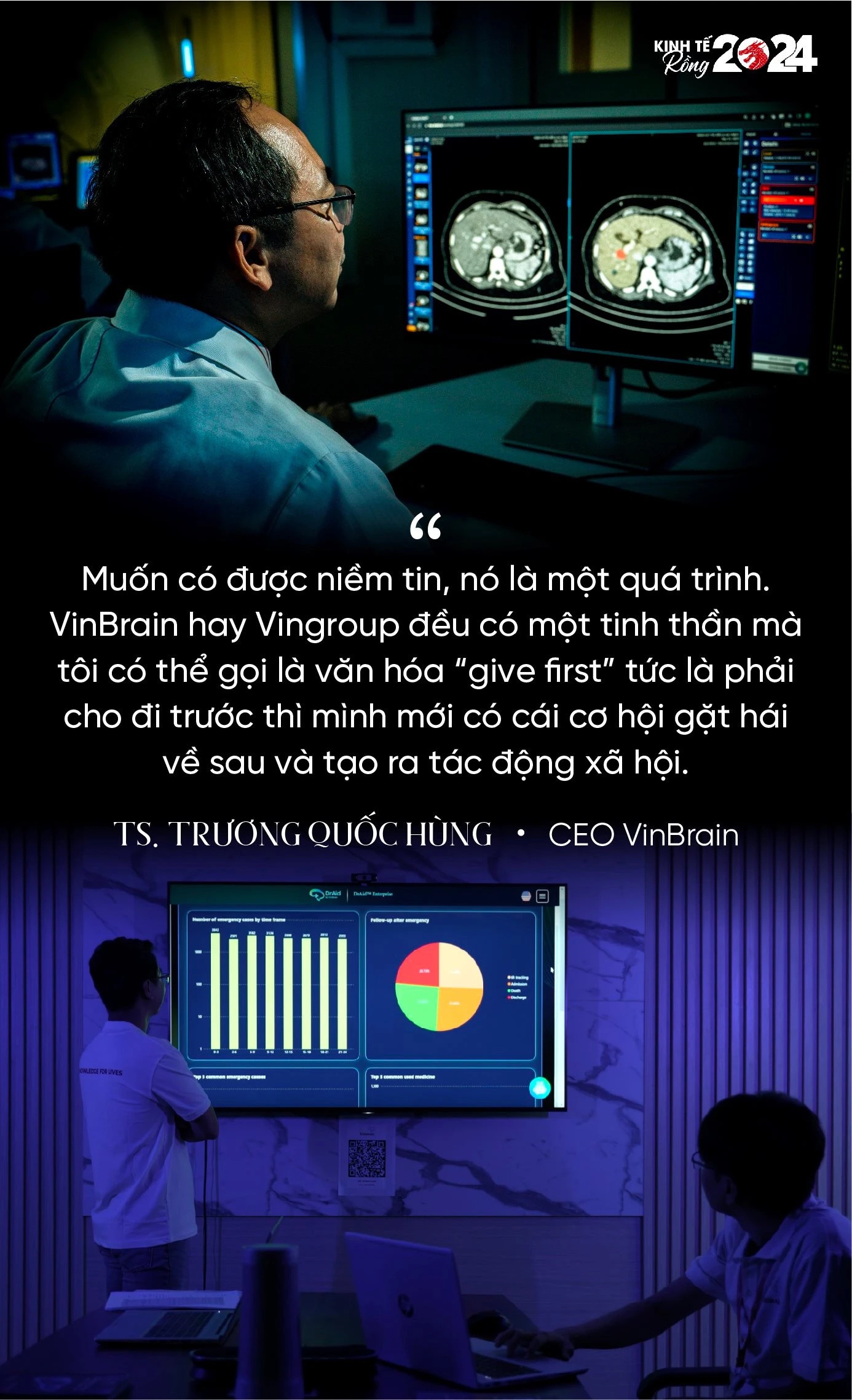 Caption: Gaining trust is a process. VinBrain and Vingroup both have a spirit that I can call "give first" culture,
Caption: Gaining trust is a process. VinBrain and Vingroup both have a spirit that I can call "give first" culture,
which means you have to give first so you have the opportunity to reap later and create social impact.
What about the pilot phase in hospitals?
There were also difficulties in the beginning.
First, it must be integrated into the hospital system. Second, we must educate the hospital team about how DrAid is useful. Dr is doctor, doctor, and Aid means assistant. Therefore, VinBrain's AI does not replace doctors but is an assistant, accompanying the doctor.
That way, doctors won't feel like it's a competition or a complete replacement for their jobs.

 Caption: The business outlet for AI in healthcare
Caption: The business outlet for AI in healthcare
How were VinBrain's first contracts implemented?
The first hospital to use VinBrain products is Vinmec. Up to now there have been nearly 100 hospitals both public and private using our products including DrAid.
The first customer in the US to use DrAid™ for chest X-ray is Nutex Health. This is a hospital system focusing on emergency and health care. At night, when patients come to the emergency room but the doctor reading the images is not there, AI will become an effective assistant to screen whether the patient has dangerous problems, especially emphysema. pleura. If pneumothorax is not treated promptly within 24 hours, the patient will die, so when identified early, they will be out of danger. If the screening shows no problems, the patient can go home, saving time.
To be able to commercialize such products in the US market, FDA is required. We are continuing to apply for certification in Europe and other markets, focusing on Indonesia and Singapore.
With such a commercial situation, what are VinBrain's business results?
Investing in artificial intelligence, especially in the medical field, is an extremely expensive problem. The biggest cost is personnel costs. 80% of VinBrain's budget goes to people who research technology, write software... and collect data, hiring a team of doctors to perform labeling.
Indeed, making medical AI is 10 times more complicated than other types of AI. First, medical data is very limited and must be collected by hospitals, not data on the Internet. Second, the process of cleaning this data is very complicated because it is not a sentence or a word, an article... It is many types of images.
Third, we have to hire good doctors to do the labeling and then model validation. They are a class of high-quality human resources with very high costs.
With the process of teaching machines, the Nvidia H100 machine costs about 6 billion VND (250,000 USD) and the Nvidia A100 machine costs about 3.6 billion, so we have to buy many machines to teach quickly. After that, it has to be re-evaluated many times, so the process takes a lot of time and effort. When deployed, it is not possible to collect money immediately but must let people use it for a trial period. So this is a long-term investment problem.
I cannot share VinBrain's business results yet, but I will just give this example. Our competitor in the international market today is a Korean company. Their revenue is only $23 million but their market capitalization is $2 billion. OpenAI is the same, its revenue is very low but its market value is hundreds of billions of dollars.
Because this is the decade of AI and AI in healthcare is one of the technologies with the greatest value. The trend of applying AI in the field of health care is an irresistible trend globally, which VinBrain has pioneered and brought products to the market.
Many large technology companies in the world such as Amazon and Google Cloud recently announced additional product development in the field of Health Care.
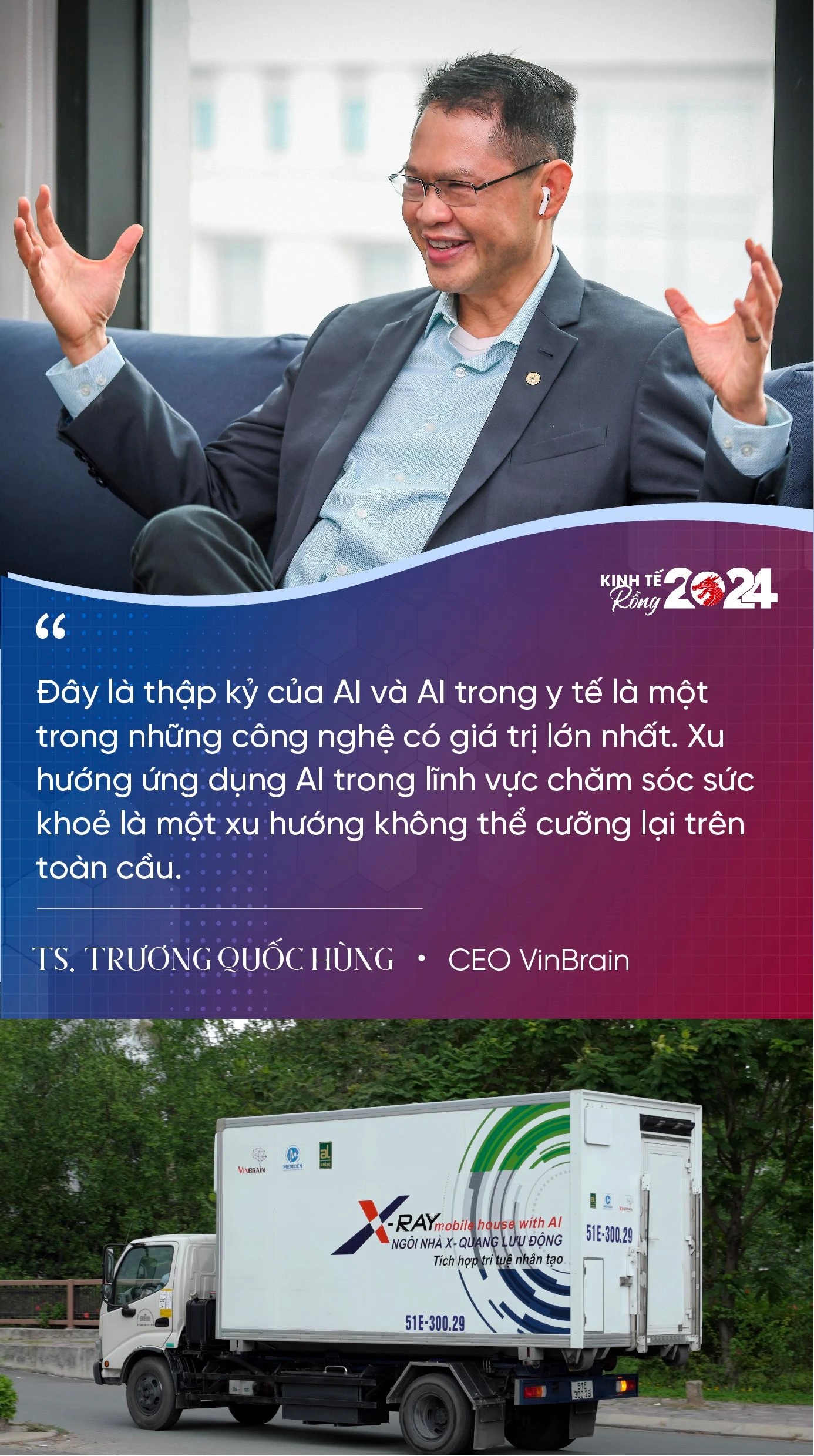 Caption: "Because this is the decade of AI and AI in healthcare is one of the technologies with the greatest value.
Caption: "Because this is the decade of AI and AI in healthcare is one of the technologies with the greatest value. Spending a lot of money and collecting change, do you have any strategies for VinBrain to speed up?
It must be determined that doing a pioneering and different problem requires investment.
Amazon was founded in 1993 and did not become profitable until 2010. It is a representative in the electronic commerce (e-commerce) industry, and e-commerce cannot be more complex than artificial intelligence.
Making AI is also different from the race to burn money to get customers in e-commerce, it lies in the business's products having to be unique, different, high quality, complete data from many countries and how that business replicates its scale. tissue. When you have those things, your product will be unique and your business will have high value.
Continuing, we stand on the shoulders of giants by signing with Microsoft, Nvidia... to master the core technology.
Up to now, the fact that international customers pay to use VinBrain products is an affirmation of quality.
What is VinBrain's 2024 plan and when is the company expected to be profitable?
It won't be until 2025 that the company is expected to be profitable. This is also a fast speed compared to the world in the field of Artificial Intelligence.
In 2024, we will focus on implementing product sales and developing the distribution system after we have FDA. Then there is the problem of turning raw data of all Vietnamese hospitals into assets for the hospital.
Until now, hospitals have found that they have a lot of data and don't know what to do with it. So now it becomes an asset, bringing new values, people will order VinBrain. VinBrain will be the architect, consultant, and developer of features according to customer needs.
Thank you for sharing these!
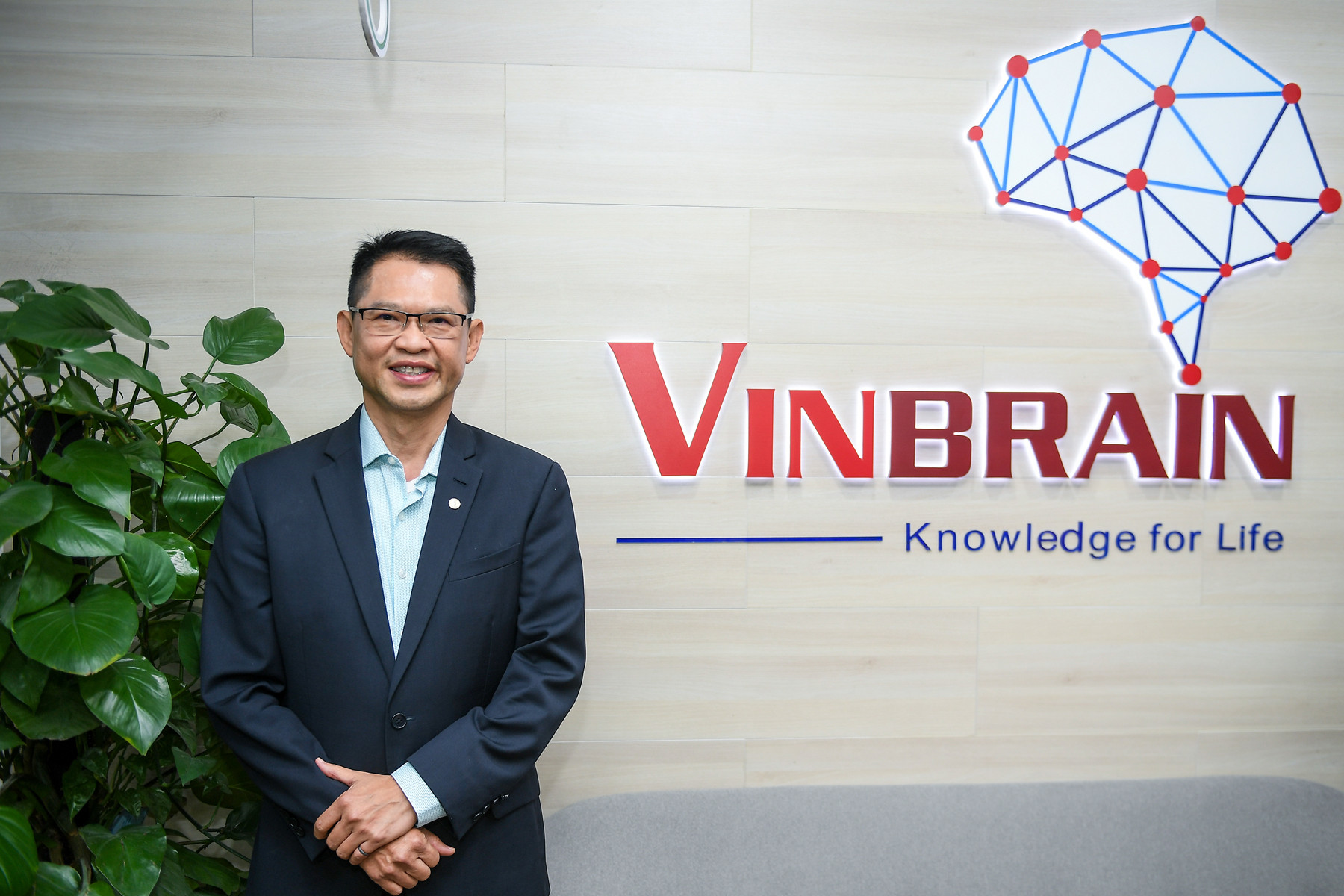
Article Sources:
Top